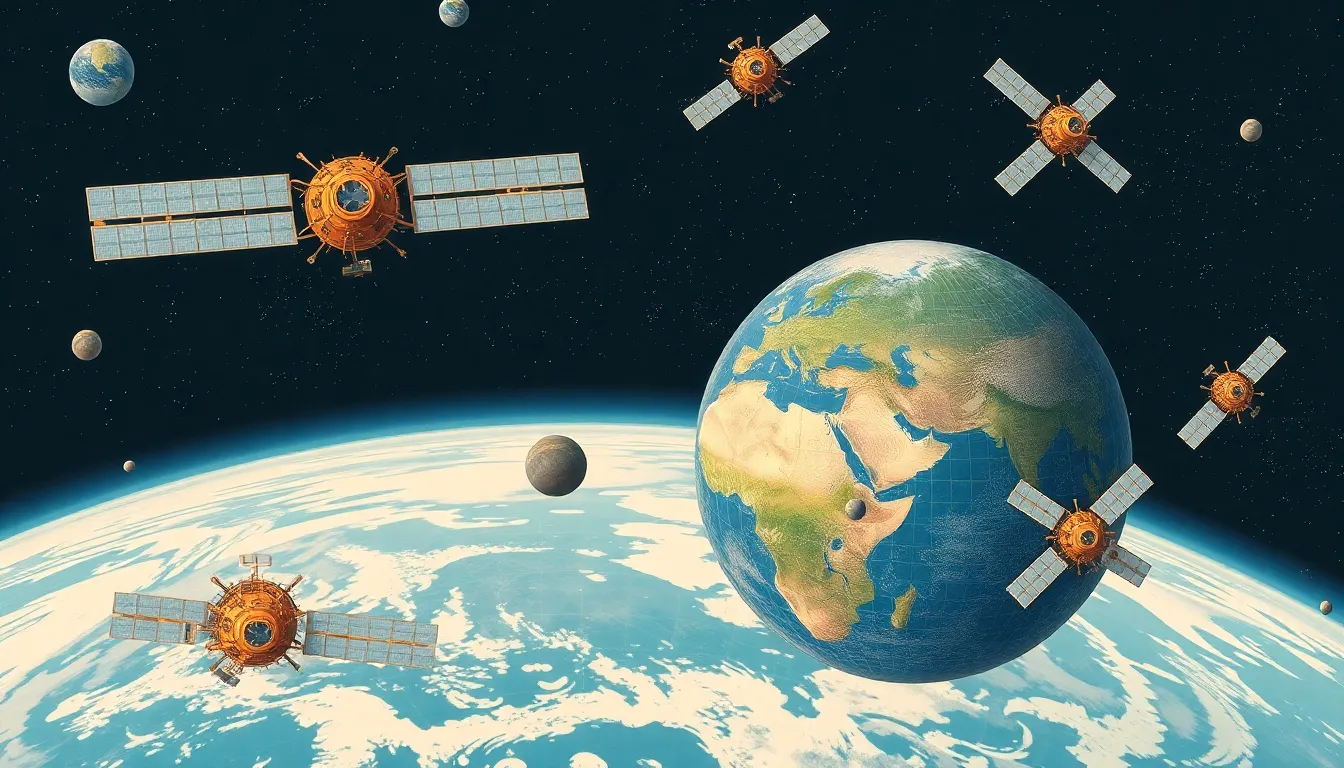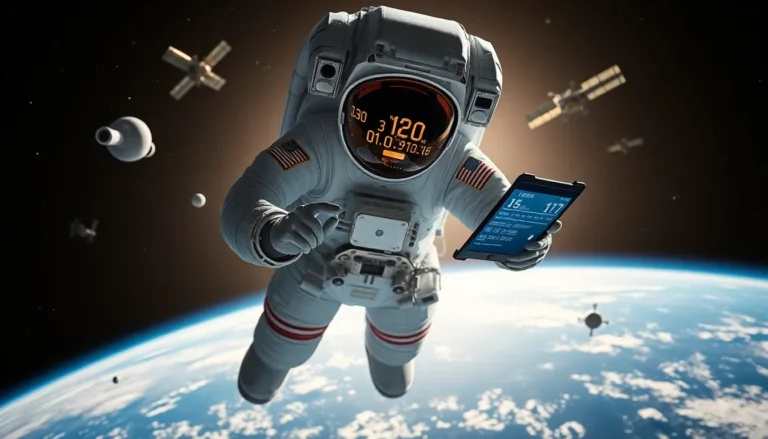In a world where smartphones can do everything but make breakfast, space-based technology is the unsung hero quietly revolutionizing our lives. Imagine satellites zipping around above, not just taking selfies of Earth but also helping with weather forecasts, GPS navigation, and even disaster response. It’s like having a superhero squad in orbit, ready to save the day while you binge-watch your favorite show.
But wait, there’s more! Space-based tech isn’t just for the geeks in lab coats. It’s the backbone of innovations that impact everyday folks, from improving internet access in remote areas to enhancing agricultural efficiency. So buckle up and get ready to explore how these cosmic gadgets are not only out of this world but also right here on Earth, making life a little easier—and a lot more interesting.
Table of Contents
ToggleOverview of Space-Based Technology
Space-based technology encompasses a range of systems and applications that operate beyond Earth’s atmosphere. Satellites, for instance, serve crucial functions including communication, navigation, and surveillance. They deliver accurate data that impacts daily life, from smartphone navigation to global communications.
Earth observation satellites monitor environmental changes, providing invaluable information to scientists and policymakers. These satellites collect data related to climate patterns, natural disasters, and resource management, enabling effective responses and strategies.
Global Positioning System (GPS) technology relies on a network of satellites to provide location services. Millions of users benefit from precise navigation offered by GPS, which supports everything from personal use to military operations. This technology contributes to enhanced safety during travel and improved logistics for businesses.
Telecommunications satellites ensure internet access in remote areas. This technology expands connectivity, allowing access to critical information and services for underserved populations. In agriculture, satellites enhance efficiency through precision farming techniques, optimizing crop yields and resource usage.
Space-based technology fuels advancements and innovation across multiple sectors. These applications create interconnected systems that improve quality of life, bolster economies, and promote sustainable practices. As technology continues to advance, its integration into everyday life will likely deepen, transforming how societies function and thrive globally.
Applications of Space-Based Technology

Space-based technology plays a crucial role in various applications that enhance everyday life. Examples include communication, earth observation, and navigation.
Communication
Satellites facilitate global communication by enabling services such as television broadcasting, internet connectivity, and telephony. Telecommunication satellites cover vast areas, providing essential links for remote locations. Enhanced bandwidth offers increased data transfer rates, transforming how people connect across the globe. Innovations in satellite technology lead to improved signal strength and reliability for users in urban and rural environments. Companies like SpaceX and OneWeb strive to democratize internet access, bringing reliable connectivity to underserved populations.
Earth Observation
Earth observation satellites gather vital data for monitoring environmental changes. These satellites track weather patterns, climate fluctuations, and natural disasters, offering insights that assist in disaster response efforts. Data from these satellites contribute to agricultural planning, ensuring farmers make informed decisions regarding crop management. Monitoring deforestation and land use changes helps governments and organizations enforce sustainable practices. Research institutions benefit from this data, enabling better predictions and strategic planning for pressing environmental challenges.
Navigation
Navigation systems depend on satellite technology to provide accurate location services. The Global Positioning System (GPS) serves millions of users daily, enhancing logistics and safety. Vehicles and smartphones utilize GPS for real-time tracking, enabling users to navigate efficiently. Additionally, businesses rely on GPS data to optimize delivery routes and reduce fuel consumption. Advancements in navigational satellites improve precision, benefiting sectors like aviation, maritime, and personal transportation.
Advantages of Space-Based Technology
Space-based technology offers numerous advantages, impacting daily life and promoting innovation across various sectors.
Global Connectivity
Satellite networks provide essential global connectivity. With services like television broadcasting and internet access, they enhance communication worldwide. Companies like SpaceX and OneWeb work tirelessly to extend connectivity to remote regions. Millions benefit from improved access to information and educational resources. By bridging digital divides, these technologies empower underserved populations, promoting equal opportunities.
Disaster Management
Disaster management improves significantly through space-based technology. Earth observation satellites deliver real-time data during natural disasters, aiding in effective response strategies. Monitoring environmental changes contributes to better preparedness for hurricanes, floods, and wildfires. Accurate data helps first responders allocate resources efficiently. The integration of satellite communication ensures coordination among organizations, minimizing the impact of disasters and enhancing recovery efforts.
Scientific Research
Scientific research relies heavily on space-based technology. Satellites capture invaluable data related to climate, weather patterns, and ecological changes. This information supports climate change studies and informs policy decisions. Research conducted in space also deepens understanding of celestial bodies and phenomena, advancing knowledge in astrophysics and planetary science. Collaboration among scientists worldwide fosters innovation and drives discoveries that benefit humanity.
Challenges in Space-Based Technology
Space-based technology faces significant challenges that impact its development and implementation. Addressing these issues is crucial for its future effectiveness.
Cost and Funding
Funding remains a primary challenge in the realm of space-based technology. Launching satellites and maintaining them incurs high costs, often reaching hundreds of millions of dollars. Governments typically allocate limited budgets for these initiatives, creating competition for financial resources. Additionally, private companies may hesitate to invest due to uncertainties in return on investment. Innovative funding models, such as public-private partnerships, have emerged to alleviate these financial constraints. Despite these efforts, securing consistent funding continues to be a hurdle for many projects.
Space Debris
Space debris poses a growing threat to satellite operations and space missions. Over 30,000 pieces of debris larger than 10 centimeters orbit Earth, with millions more smaller fragments in space. Collisions with debris can severely damage or destroy operational satellites, affecting communication and navigation services. Efforts to track and mitigate debris remain in early stages, leading to concerns about the long-term sustainability of space activities. Developing technologies to remove debris and implementing stricter launch protocols may address these concerns, ensuring safer operations in space.
The Future of Space-Based Technology
Emerging technologies promise to expand the capabilities of space-based systems significantly. Innovations in satellite design and launch techniques reduce costs while increasing access to space. The trend towards miniaturization allows for smaller, more efficient satellites, which democratizes space exploration and utilization. Enhanced communication systems link satellites in networks, improving data collection and transmission.
Artificial intelligence plays a crucial role in analyzing satellite data. Rapid processing of information enhances decision-making, especially in disaster response scenarios. With AI, prediction models grow more accurate, leading to timely interventions during emergencies. Moreover, machine learning algorithms refine earth observation processes, increasing the efficiency of climate monitoring.
Collaborations between public and private sectors strengthen space initiatives. Partnerships fuel investments, enabling ambitious projects such as lunar bases and Mars colonization. Companies like SpaceX and Blue Origin push the envelope of commercial space travel and resource utilization. These ventures not only expand horizons but also inspire a new generation of aspiring scientists and engineers.
Sustainable practices become essential as space exploration expands. Satellites now focus on monitoring climate change and natural resource management. Upcoming projects emphasize minimizing space debris and developing reusable launch systems. Addressing these challenges ensures long-term viability for space-based technology.
Global communication networks also stand to gain from space advancements. Future satellite constellations promise reliable internet access worldwide, bridging digital divides. Education and healthcare can benefit, especially in remote areas, by providing essential services and information.
Innovations within satellite technology will continue shaping industries, from agriculture to urban planning. Staying aware of emerging trends allows individuals and organizations to leverage satellite capabilities effectively. Prioritizing further research and development ensures that space-based technology achieves its full potential.
Space-based technology is reshaping the world in profound ways. Its influence spans various sectors from communication to agriculture and disaster management. As innovations continue to emerge, the potential for enhancing global connectivity and improving lives is immense.
However, challenges like funding and space debris must be addressed to ensure sustainable growth. By fostering collaboration between public and private sectors and prioritizing research, the future of space-based technology can unlock even greater advancements. Embracing these changes will lead to a more connected and resilient world, where the benefits of space technology are accessible to all.





